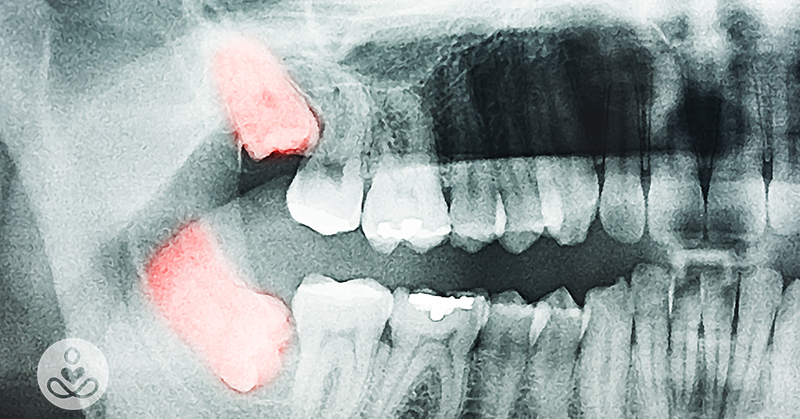Many of you have probably suffered through the pain that your third molars – or ‘wisdom teeth’ – caused some years back. Somewhere along the line a dentist, orthodontist, or oral surgeon probably advised you to remove them. But for what reason? They may have told you that wisdom teeth can force your other teeth to become crooked or cause a lot of pain. They may have given no explanation at all other than it’s just what you do when you reach a certain age, usually in your late teens or early twenties.
Studies are mounting, however, and suggest that routine wisdom teeth removal is a waste of time. They aren’t hurting me. I don’t feel any discomfort. If I don’t absolutely have to, I’d rather not. Those are all phrases present-day dentists and oral surgeons probably hear day in and day out based on the evidence. So, could your wisdom tooth surgery have been entirely unnecessary?
What are Wisdom Teeth?
Wisdom teeth are your third and final set of molars that usually develop in late adolescence. If they grow in healthy and properly aligned, you’re in luck! It seems rare for this to happen in comparison to wisdom teeth that grow in horizontally and need to be removed. But what for?
Doctors advise you to remove misaligned (and possibly impacted) wisdom teeth because they can potentially damage surrounding teeth, nerves, or your jawbone. There’s even more cause for concern if you have a wisdom tooth that’s partially erupted because its small, hard-to-reach opening makes it difficult to clean and prone to bacteria, infection, tooth decay, jaw stiffness, and more.[1]
The Necessity of Removing Your Wisdom Teeth
It’s important to realize that we can’t generalize about something like wisdom teeth. Everyone’s bodies are shaped differently, grow differently, and have different chemical makeups. This makes wisdom teeth removal a case by case basis.
But one study in the American Journal of Public Health stated that dentists and oral surgeons extract 10 million wisdom teeth from 5 million people every year in the United States. These procedures total a whopping $3 billion dollars.
With these removals come pain, swelling, bruising, malaise, and the risk of permanent paresthesia (i.e., numbness or the lip, tongue and cheek caused by nerve injury during surgery). As a result, patients take an average of 11 million days off due to “standard discomfort or disability.”[2]
Some people may be able to forgive the pain as it’s something that can easily happen in wisdom tooth removal. What’s alarming, however, is that over two thirds of extractions, associated costs, and injuries that occur are unnecessary. The researchers even went so far as to say that this “constitutes a silent epidemic that afflicts tens of thousands of people with lifelong discomfort and disability.”[2]
In an interview with The New York Times, chairman of orthodontics at the University of Washington in Seattle Greg J. Huang said, “Everybody is at risk for appendicitis, but do you take out everyone’s appendix?”
On the other hand, one expert weighs in: “It’s hard to get a percentage, but probably 78 to 80 percent of people do not meet the criteria of being able to successfully maintain their wisdom teeth,” said Dr. Louis K. Rafetto, who headed the American Association of Oral and Maxillofacial Surgeons.[3]
Clearly, there are professionals in the field who don’t see the value in wisdom teeth removal, at least to the extreme that it occurs. When is it necessary then?
Who Really Requires Wisdom Teeth Removal (and When)
According to the American Public Health Association (APHA), you should get remove your wisdom teeth. But only if a dental professional has provided evidence that shows a necessary need. In fact, APHA opposes prophylactic removal (i.e., it’s intended to prevent disease) and claims that procedures such as this “[subject] individuals and society to unnecessary costs, avoidable morbidity, and the risks of permanent injury.”[4]
Generally, people are between the ages of seventeen and twenty-five when they undergo wisdom tooth surgery. Although, your personal growth and development determine this. So, it’s possible for them to come out before or after this time frame if absolutely necessary. Below, we outline when you probably should and shouldn’t remove your wisdom teeth:[1,5,6]
You Don’t Need to Remove Wisdom Teeth If They’re…
- Healthy (i.e., no tooth decay or inflamed gums)
- Fully erupted
- Properly aligned and not interfering with any neighboring teeth
- Easy to clean while you brush and floss
You Do Need to Remove Wisdom Teeth If They’re…
- Completely impacted (i.e., hidden under the gum and can’t erupt) which can lead to cysts that damage the root of other teeth
- Half erupted with openings or gum flaps that are prone to bacteria accumulation and cavities
- Causing overcrowding which can make straight teeth crooked or damage neighboring teeth
- Responsible for any oral pain
- Contributing to soft tissue or gum infections
- Resulting in tumors
- Forcing tooth decay on neighboring teeth that are beginning to break
If you or someone you know is considering a surgery like this, send this article their way. Of if they’ve already scheduled a wisdom teeth removal, suggest these natural remedies. They’re perfect for keeping your mouth, teeth, and gums clean and healthy pre- and post-surgery!
Sources
- [1] https://www.webmd.com/oral-health/wisdom-teeth#1
- [2] https://www.ncbi.nlm.nih.gov/pmc/articles/PMC1963310/
- [3] https://www.nytimes.com/2011/09/06/health/06consumer.html?_r=0
- [4] https://www.apha.org/policies-and-advocacy/public-health-policy-statements/policy-database/2014/07/24/14/29/opposition-to-prophylactic-removal-of-third-molars-wisdom-teeth
- [5] https://www.webmd.com/oral-health/wisdom-teeth-removal-necessary
- [6] https://www.mayoclinic.org/diseases-conditions/wisdom-teeth/expert-answers/wisdom-teeth-removal/faq-20058558

